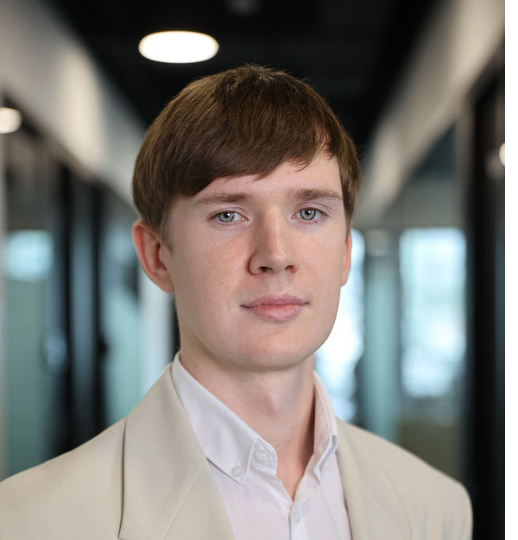Mgr. Silvester Krčméry, PhD. works as project manager in Civitta Slovakia consultancy company. He participates in several national and international research projects as well as capacity and educational projects. He is responsible for Slovak EIT Health Hub designed to support innovations in healthcare, strives to join the biggest European Healthcare Innovation community and as a coach in Challenger accelerator he deals with support of start-up companies. We interviewed Silvester Krčméry regarding occasions for innovators connected to European Institute of Innovations and Technology initiative, which goal is to help enterprises, educational and research bodies to cooperate in creating favourable environment for innovations and business in Europe. We would like to know in which aspect he sees the biggest contribution of EIT initiative for Slovakia.
At COINTT 2022 Conference you hosted the discussion about occasions for innovators connected to European Institute of Innovations and Technology (EIT) initiative. In which aspect do you see the biggest contribution of this initiative for Slovakia?
The most significant contribution I see in the development of local innovation environment and performing activities that may help students, researchers and entrepreneurs to find the best way how to improve their skills and successfully realize their ideas at the market. Our common aim is to find and support the most talented people, entrepreneurs, start-ups and small and middle-sized enterprises from Slovakia in creating new economic activities. EIT is our natural partner in this effort and they help us to develop innovative products and services, establish new companies and educate new generation of entrepreneurs. Together we support Slovak innovators in turning their best ideas to the products, services and new job opportunities.
Currently you act as a manager of Slovak EIT Health Hub Civitta Slovakia focused on supporting innovations in healthcare. Which tools this Hub offers and who can use them in particular?
New Slovak EIT Health Hub offers financing, educational, mentoring and networking tools to all key actors in Slovak healthcare system. Programmes and activities of EIT Health can be accessed by particular target groups, as for example start-ups, healthcare professional associations, students, researchers, doctors and other medical specialists.
How successfully are we able to respond to these current challenges in your opinion?
We have several challenges in healthcare to be addressed and digital technologies are exactly an answer to some of them. As Hub we organized for example Hack Healthcare, the first big hackathon in Slovakia focused on accelerating changes in healthcare. We gathered community of innovators, programmers and medical experts that developed solutions to specifical challenges. To give you some idea, we contributed to the development of new interactive communication portal for paediatricians, worked on remote monitoring of patients with chronic diseases as well as improving prediction of consumption of medicines. Those activities resulted in new solutions responding to the aim to improve life of patients in Slovakia as soon as possible. Currently we are working on implementation of these solutions.
Where are the weaknesses of technology transfer in Slovakia and where is on the other hand its potential?
Institutional approach, trainings, examples of best practices and documents in English language are missing. Personally, I see the potential in intellectual capital of universities. We have a lot of excellent, erudite innovators and scientists.
You also cooperate with universities. What recommendations do you have for universities while they are interested in investor´s capital?
Basic research is not limited by its financial value. If there is potential, we should utilise it. In this context it is important to emphasize to scientists that they have to know how to win recognition. They should present themselves in the way investors will listen to. We can help them with it via various educational programmes. Obtaining funding from EIT can be also considered as justification while applying for investor´s capital or for future grant schemes.
What experience in intellectual property area research workers and beginning entrepreneurs report to you on?
Generally, it seems that scientists have proper level of knowledge about intellectual property, but the most common problem is, that employees who create industrial property matters register it by their own name as applicants. However, this problem appears less frequently thanks to technology transfer centres’ activities, but technology transfer centres at universities are often understaffed. Research workers and beginning entrepreneurs sometimes experience lack of legal consciousness there.
What do you think about services provided by Technology Transfer Centre of SCSTI? Do you agree that services provided by it are beneficial for Slovak scientific-research institutions?
Support services connected to technology transfer implementation to practice, as for example identification and evaluation of research results or active commercialization are indisputably beneficial for Slovak scientific-research institutions. Nevertheless, I will welcome more emphasis on establishing spin-off companies. We could have more successful stories from universities (question of establishing spin-off companies at universities as well as answer to query why we cannot present more examples of private companies founded in academic environment is more complex and needs to be explained in detail). Having technology with commercialization potential is not enough in this case. We can see significant influence of human factor and its excellence in this area at academic institutions (technology transfer centres, management of university), author and promoter of the idea (entrepreneur – entrepreneurial spirit and business skills are missing) and finally general level of business environment development which also plays an important role in this process (access to capital – financial and personal, legislative barriers etc.) Technology Transfer Centre of SCSTI is ready to offer help in these issues if academic institution expresses its interest in intellectual property commercialization in that way. The assistance will be provided via consultancy service as well as specific guidance which should lead to establishing private business company – editor´s note.
How do you see Recovery plan and support of innovations from the Slovak government?
We should ideally implement innovation policies with positive influence on innovations‘ ecosystem. We can consider the Recovery plan as relatively innovative approach from the government side. It is something different as centralised European Union programmes that we have already here for several years. Implementing particular tasks for solving problems in technology transfer to strategic Recovery plan documents will be indisputably beneficial step. Defining minimal standard of asset disposal in intellectual property form created from public sources at public scientific-research institutions as well as assigning authority to verify fulfilment of conditions of such minimal standard will be helpful too, as proposed by the Department of Technology Transfer at the Slovak Center for Scientific Technical Information (SCSTI) in the National Research, Development and Innovation Strategy. And of course, we should not omit establishing incentive instruments, e.g., patent fund, proof of concept fund or other supplementary support services in technology transfer process.


